It’s Time To Balance Your Dental Health Meets Nutrition
We believe in the powerful connection between healthy eating and oral health. Our approach goes beyond traditional dental care, blending nutrition science with dental health to give you the best of both worlds.
Why Choose Us?
Healthy Eating for Stronger Teeth and Gums
Personalized Nutritional Plans
We tailor your diet to your specific oral health needs.
Sustainable Lifestyle Changes
Achieve long-term oral health by integrating small, manageable changes into your daily routine.
Expert Advice
Our nutritionists and dental specialists work together to promote lasting dental health.
Nutrition
Why Nutrition Matters for Dental Healt
Good nutrition is not just about strong bones and muscles; it’s about keeping your teeth and gums in optimal condition. By choosing the right foods, you can:
-
Prevent cavities and gum disease
-
Strengthen enamel
-
Reduce inflammation
-
Promote healthier saliva flow
We offer easy-to-follow dietary strategies that integrate seamlessly into your life, giving you the tools to maintain optimal oral health.
Top Dental Health Practices for a Stronger Smile
One of the most fundamental practices for maintaining a strong and healthy smile is brushing your teeth correctly. Brushing at least twice a day is essential for removing plaque, food particles, and bacteria that accumulate on your teeth. It’s important to use fluoride toothpaste, as fluoride strengthens tooth enamel and helps prevent cavities. When brushing, use gentle circular motions to avoid damaging your gums or enamel. A soft-bristled toothbrush is ideal, as it effectively cleans without being too abrasive. Don’t forget to brush your tongue as well, as bacteria can accumulate there, leading to bad breath and other oral health issues. By brushing properly, you ensure that your teeth remain clean, your gums stay healthy, and your smile stays bright.
Flossing to Reach Between the Teeth
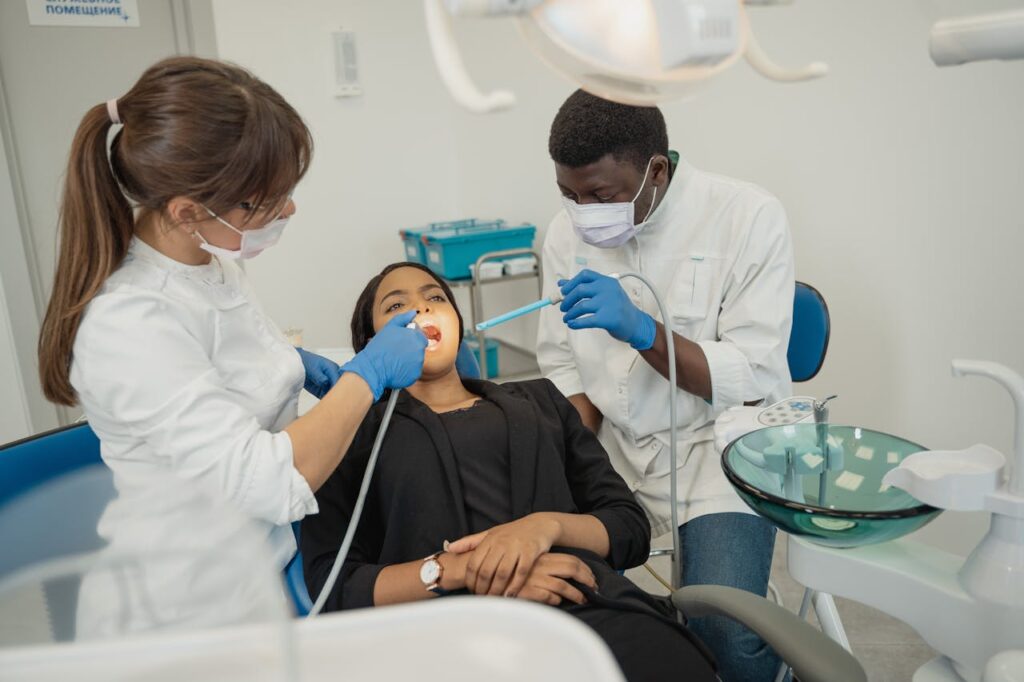
While brushing is essential, it only cleans the surface of your teeth. Flossing is just as important because it allows you to clean the areas between your teeth, where your toothbrush might not reach. Flossing daily helps to remove plaque and food debris from these tight spaces, preventing cavities and gum disease. It also helps to reduce the risk of gum inflammation and bleeding, which can lead to more serious oral health issues over time. Make sure to floss gently to avoid injuring your gums, and use a clean section of floss for each space to avoid transferring bacteria. Regular flossing, combined with brushing, ensures a complete oral care routine that promotes a stronger and healthier smile.
Using Mouthwash for Extra Protection
Incorporating mouthwash into your daily dental routine can offer additional protection against harmful bacteria. Mouthwash helps to rinse away any remaining food particles and plaque that may be left behind after brushing and flossing. It also reaches areas that are difficult to clean with a toothbrush or floss. Many mouthwashes contain antibacterial ingredients that help reduce the risk of gum disease, cavities, and bad breath. Additionally, some mouthwashes are formulated to strengthen enamel, protect against tooth sensitivity, and provide long-lasting freshness. Using mouthwash can be a simple yet effective way to enhance your oral care routine and keep your smile looking and feeling its best.
Eating a Balanced Diet for Optimal Oral Health
Your diet plays a crucial role in maintaining a healthy smile. Eating a balanced diet rich in vitamins and minerals helps to strengthen teeth and gums. Calcium, found in dairy products, leafy greens, and fortified foods, is essential for maintaining strong tooth enamel and preventing tooth decay. Vitamin D helps your body absorb calcium, so it’s important to get enough sunlight or consume foods like fatty fish and egg yolks. Additionally, foods rich in fiber, such as fruits and vegetables, can help stimulate saliva production, which naturally protects teeth by neutralizing acids and washing away food particles. Avoid sugary snacks and drinks, as they promote bacteria growth in the mouth, which can lead to cavities and gum disease. A nutritious diet not only supports your overall health but also contributes to a stronger, healthier smile.
Regular Dental Visits for Professional Care
Even with a solid daily oral care routine, regular visits to your dentist are essential for maintaining a strong smile. Dental professionals can identify potential issues that may not be visible or detectable at home, such as cavities, gum disease, or early signs of oral cancer. Routine checkups and cleanings help to remove plaque and tartar buildup that can lead to tooth decay and gum inflammation. Dentists also provide valuable advice on how to improve your brushing and flossing techniques, ensuring that you are following the best practices for your specific oral health needs. Scheduling regular dental visits, typically every six months, ensures that any problems are addressed early, allowing you to maintain optimal oral health and a beautiful, strong smile for years to come.
The Importance of Regular Dental Health Maintenance
Regular dental health maintenance is essential for preventing common oral health problems, including tooth decay and gum disease. Tooth decay occurs when plaque, a sticky layer of bacteria, builds up on your teeth. If not properly removed through brushing and flossing, plaque can lead to cavities, which, if untreated, may result in tooth loss. Gum disease, also known as periodontal disease, can begin as gingivitis, which causes inflammation and bleeding of the gums. If not addressed, it can progress to more severe forms, such as periodontitis, leading to gum recession and tooth loss. Regular dental checkups help identify early signs of these issues and allow for prompt treatment, ultimately saving your teeth and gums from long-term damage.
Maintaining Fresh Breath and Oral Hygiene
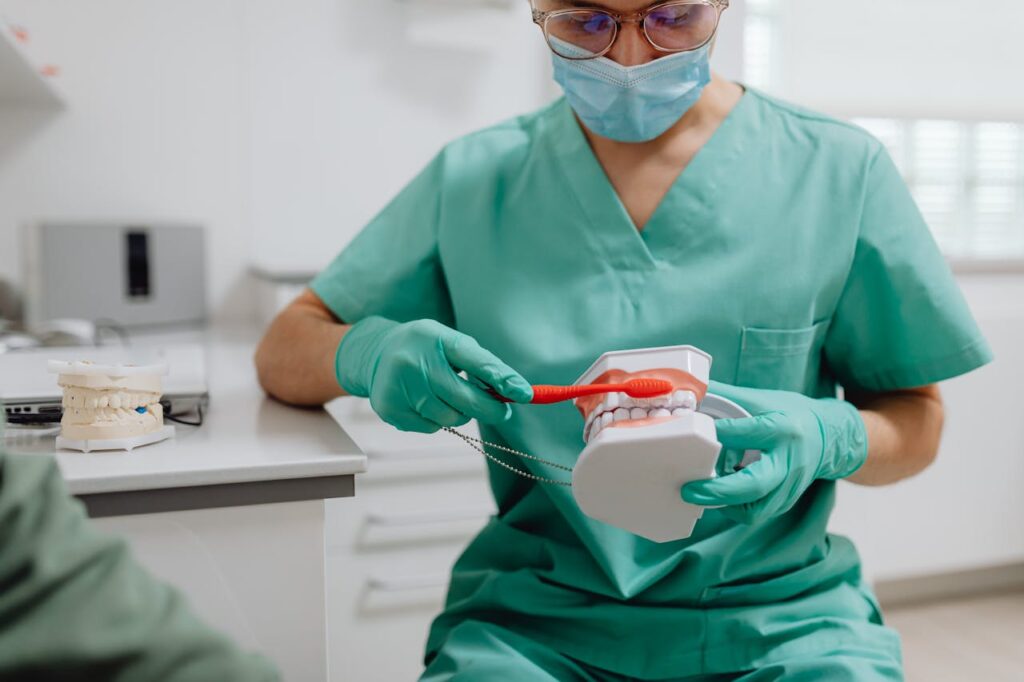
Good oral hygiene not only helps you maintain a healthy smile but also contributes to fresh breath. Bad breath, or halitosis, can be caused by a buildup of bacteria in the mouth, which is often linked to poor oral hygiene. Regular visits to the dentist help ensure that your mouth remains clean and free of harmful bacteria that can cause unpleasant odors. Professional cleanings remove plaque and tartar that cannot be removed by regular brushing, improving the overall freshness of your breath. By maintaining regular dental care, you can prevent bad breath and ensure your oral hygiene is at its best, helping you feel confident throughout the day.
Early Detection of Oral Health Issues
One of the most important benefits of regular dental maintenance is the early detection of potential oral health problems. During routine checkups, dentists perform thorough exams that can identify issues such as cavities, gum disease, oral cancer, and even systemic health conditions that manifest in the mouth. Early detection allows for less invasive treatment options, which are often more effective and less costly than addressing problems at a later stage. For example, detecting cavities early can prevent the need for extensive fillings or root canals. Likewise, catching gum disease in its early stages allows for non-surgical treatments, which can prevent further damage to the gums and teeth.
Improving Overall Health
The condition of your oral health can directly impact your overall health. Poor oral hygiene has been linked to several serious health conditions, including heart disease, diabetes, and respiratory infections. Gum disease, in particular, has been associated with an increased risk of cardiovascular issues, as the bacteria in the mouth can enter the bloodstream and contribute to inflammation in the arteries. Regular dental maintenance helps not only to keep your teeth and gums healthy but also to reduce your risk of developing systemic health problems. By committing to regular dental checkups and proper at-home oral care, you are actively taking steps to safeguard your overall well-being.
Cost-Effective Care in the Long Run
While it might seem like a routine dental visit is an added expense, it is actually a cost-effective measure in the long run. Preventative care through regular checkups and cleanings can help you avoid more costly procedures down the road, such as root canals, crowns, or extractions. Regular dental maintenance ensures that any developing issues are caught early, before they require more extensive and expensive treatment. By investing in routine dental visits, you are essentially saving money while maintaining the health of your teeth, gums, and overall well-being. Regular dental care is one of the most affordable ways to protect your smile and keep dental expenses manageable.
Achieving Optimal Dental Health: A Complete Guide
Dental health plays a vital role in our overall well-being. It extends beyond just having a bright smile — it impacts your ability to eat, speak, and even affects your self-esteem. Poor oral hygiene can lead to a range of issues such as tooth decay, gum disease, and bad breath. In addition to these visible problems, poor oral health has also been linked to more severe conditions, including heart disease and diabetes. Therefore, it’s crucial to maintain good dental habits throughout your life. Achieving optimal dental health requires a combination of preventive measures, proper care, and regular professional checkups.
Building a Strong Oral Care Routine
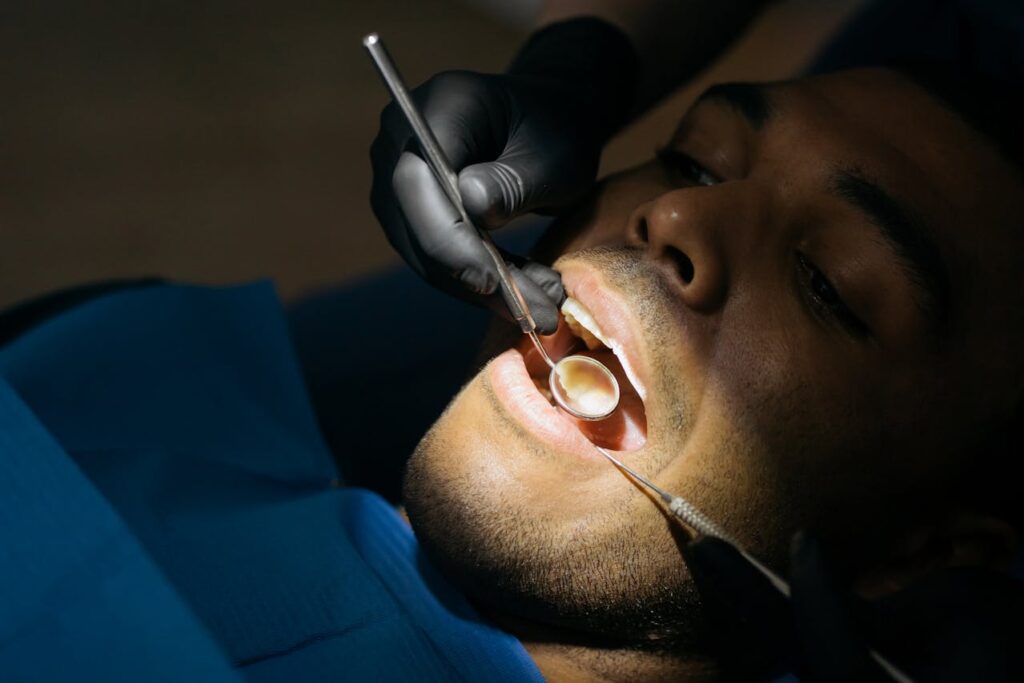
To maintain optimal dental health, a strong oral care routine is essential. This starts with brushing your teeth at least twice a day using fluoride toothpaste. Proper brushing helps remove plaque — a sticky, colorless film of bacteria that forms on your teeth and gums. Don’t forget to use a soft-bristled toothbrush to avoid damaging your gums and enamel. In addition to brushing, flossing daily is crucial to reach areas between teeth that a toothbrush might miss. An antibacterial mouthwash can also help kill bacteria and freshen breath, adding an extra layer of protection against oral diseases. Establishing this routine early on helps prevent cavities and gum disease.
The Role of a Balanced Diet in Dental Health
What you eat directly affects your dental health. A balanced diet rich in fruits, vegetables, whole grains, and lean proteins can provide the nutrients your teeth and gums need to stay healthy. Avoid sugary snacks and drinks, as sugar feeds the bacteria in your mouth, leading to plaque buildup and tooth decay. Instead, choose foods high in calcium and vitamin D, such as dairy products and leafy greens, which help strengthen your enamel and support healthy bone structure. Drinking plenty of water throughout the day also helps wash away food particles and bacteria, preventing dry mouth, which can contribute to cavities and bad breath.
Visiting Your Dentist Regularly
Even with a great oral care routine, regular visits to your dentist are essential for maintaining optimal dental health. Professional cleanings every six months are recommended to remove tartar buildup that cannot be addressed with regular brushing. During these visits, your dentist will also conduct a thorough exam to check for any early signs of cavities, gum disease, or oral cancer. Early detection of these conditions can lead to less invasive and more effective treatment options. Regular checkups are also a great opportunity to ask your dentist for personalized advice on how to further improve your oral health.
The Importance of Habits Beyond Brushing and Flossing
Achieving optimal dental health isn’t just about brushing, flossing, and seeing the dentist; it’s also about maintaining habits that protect your teeth over time. For example, avoid smoking, as it significantly increases the risk of gum disease, tooth loss, and oral cancer. Wearing a mouthguard while playing sports or grinding your teeth at night can protect against trauma and tooth damage. Additionally, be mindful of how much acidic food or drinks you consume, as they can erode your enamel. Lastly, if you notice any signs of dental problems such as bleeding gums, persistent tooth pain, or sensitivity, seek professional care immediately to prevent further complications.
Foods That Support Oral Health: Key Nutritional Insights
Maintaining good oral health goes beyond just brushing and flossing. What you eat plays a crucial role in keeping your teeth and gums healthy. Nutrient-rich foods can strengthen tooth enamel, reduce the risk of gum disease, and promote overall oral hygiene. By incorporating the right foods into your diet, you can help support the health of your mouth and smile. Here are some key nutritional insights about foods that benefit your oral health.
Calcium-Rich Foods for Strong Teeth

Calcium is one of the most vital nutrients for maintaining strong teeth and bones. It helps to build and reinforce tooth enamel, the hard outer layer that protects your teeth from decay. Without enough calcium, your enamel can weaken, making your teeth more vulnerable to cavities and damage. Dairy products like milk, cheese, and yogurt are excellent sources of calcium. For those who prefer non-dairy options, fortified plant-based milks, leafy greens, almonds, and tofu can provide the necessary calcium to keep your teeth strong and protected.
Vitamin C and Its Role in Gum Health
Vitamin C is crucial for maintaining the health of your gums and connective tissues. It helps to strengthen blood vessels and supports tissue repair, which is important for healthy gums. A lack of vitamin C can lead to swollen, bleeding gums and may contribute to the development of gum disease. Foods rich in vitamin C, such as citrus fruits, strawberries, bell peppers, and broccoli, are essential for keeping your gums healthy and reducing the risk of gum infections. Incorporating these foods into your diet can help ensure that your gums stay strong and resilient.
Water for Clean Teeth and Healthy Gums
Water is essential not just for hydration but for maintaining good oral health. It helps wash away food particles, bacteria, and plaque that can accumulate on your teeth and gums. Drinking water throughout the day ensures that your mouth stays hydrated and prevents dry mouth, which can increase the risk of cavities and gum disease. Water also encourages the production of saliva, which is your mouth’s natural defense system against tooth decay. Saliva helps neutralize acids in the mouth, remineralize enamel, and prevent harmful bacteria from taking hold. By drinking water regularly, you can promote a clean mouth and healthy gums.
Fiber-Rich Foods for Natural Teeth Cleaning
Fiber-rich foods, such as fruits, vegetables, and whole grains, offer multiple benefits for oral health. These foods stimulate saliva production, which is essential for washing away food particles and neutralizing harmful acids. In addition, fiber-rich foods act as natural scrapers, helping to remove plaque from your teeth as you chew. Apples, carrots, celery, and leafy greens are all excellent choices that can help keep your teeth clean while also providing important vitamins and minerals. Including more fiber in your diet supports your oral hygiene efforts and helps maintain a healthy mouth.
The Power of Phosphorus and Magnesium
Phosphorus and magnesium are often overlooked when it comes to oral health, but these minerals play an essential role in maintaining strong teeth. Phosphorus helps with the formation of tooth enamel and bone structure, making it vital for overall dental health. Foods such as eggs, fish, meat, and nuts are excellent sources of phosphorus. Magnesium, on the other hand, works alongside calcium to strengthen bones and teeth. Foods rich in magnesium include leafy green vegetables, nuts, seeds, and whole grains. By including these minerals in your diet, you can help protect your teeth from decay and ensure that your bones and teeth stay strong for years to come.
How Diet Affects Your Teeth: Essential Nutrition Tips
The food you eat plays a significant role in maintaining the health of your teeth. What goes into your body can either protect your teeth or contribute to dental problems such as cavities, gum disease, and enamel erosion. By understanding how your diet affects your teeth, you can make better choices that support your oral health. Here are essential nutrition tips to help protect your teeth and maintain a beautiful, healthy smile.
The Role of Calcium in Strengthening Teeth

Calcium is one of the most important nutrients for your teeth. It helps to build and maintain strong tooth enamel, which is the outermost layer of your teeth. Enamel protects the softer layers of your teeth from decay and damage. Dairy products like milk, cheese, and yogurt are rich sources of calcium, but there are also non-dairy options such as fortified plant-based milks, leafy green vegetables, almonds, and tofu. Including calcium-rich foods in your diet can help protect your teeth from cavities and prevent them from becoming weak and brittle over time.
Vitamin D and Its Importance for Tooth Health
Vitamin D works hand in hand with calcium to promote optimal dental health. It helps your body absorb calcium efficiently, ensuring that it is properly utilized to strengthen your teeth and bones. Without enough vitamin D, your teeth may become more susceptible to decay and gum disease. You can get vitamin D from sunlight exposure, as well as from foods like fatty fish, egg yolks, and fortified dairy products. Including these in your diet will help maintain strong, healthy teeth and gums.
The Impact of Sugar on Dental Health
Sugar is one of the biggest culprits in the deterioration of dental health. When you consume sugary foods and drinks, the bacteria in your mouth feed on the sugar, producing acids that attack your tooth enamel. This acid can lead to cavities and tooth decay. Common sugary foods like candies, soda, and baked goods are especially damaging when consumed frequently throughout the day. To protect your teeth, try to limit sugary snacks and beverages, and make sure to rinse your mouth with water after consuming them to help wash away sugar and neutralize acids.
Hydration and Its Role in Oral Health
Drinking plenty of water is essential for maintaining good oral health. Water helps rinse away food particles and bacteria that can lead to plaque buildup and bad breath. It also promotes the production of saliva, which acts as the mouth’s natural defense against acids and harmful bacteria. Saliva helps neutralize acids, remineralize enamel, and wash away debris. In addition, water helps keep your gums hydrated and prevents dry mouth, which can increase the risk of cavities and gum disease. Make water your beverage of choice to ensure your teeth stay clean and healthy.
The Benefits of Fiber for Dental Health
Fiber-rich foods, such as fruits, vegetables, and whole grains, are not only good for your digestive health but also benefit your teeth. These foods help stimulate saliva production, which plays a crucial role in protecting your teeth and gums. Saliva helps wash away food particles, neutralize acids, and remineralize tooth enamel. Chewing fiber-rich foods also helps clean your teeth naturally by scrubbing away plaque and preventing the buildup of harmful bacteria. Foods like apples, carrots, celery, and leafy greens are excellent choices for supporting your oral health while providing the necessary nutrients for a balanced diet.
Nutritional Tips for a Healthier Smile
A bright and healthy smile starts with more than just brushing and flossing. What you eat plays a significant role in maintaining the health of your teeth and gums. Proper nutrition can help prevent cavities, gum disease, and other oral issues. By choosing the right foods and drinks, you can protect your teeth and ensure a radiant smile for years to come.
The Importance of Calcium for Strong Teeth

Calcium is essential for maintaining strong teeth and bones. It helps to build and maintain tooth enamel, which is the protective outer layer of your teeth. Dairy products such as milk, cheese, and yogurt are excellent sources of calcium. If you’re lactose intolerant or prefer non-dairy alternatives, there are other options like fortified plant-based milks, leafy green vegetables, and almonds. Consuming calcium-rich foods regularly can help reduce the risk of tooth decay and maintain a solid foundation for your smile.
Vitamin C and Gum Health
Vitamin C is not only important for your immune system but also plays a key role in maintaining the health of your gums. It helps strengthen the blood vessels in your gums and promotes tissue healing. A deficiency in vitamin C can lead to gum problems like swelling and bleeding, which may progress to gum disease if left untreated. Foods rich in vitamin C include citrus fruits like oranges and grapefruits, strawberries, bell peppers, and broccoli. Including these in your daily diet can help ensure healthy gums and a stronger smile.
Hydration for Oral Health
Staying hydrated is just as crucial for your oral health as it is for your overall well-being. Drinking plenty of water helps rinse away food particles and bacteria that can contribute to plaque build-up and bad breath. It also promotes the production of saliva, which naturally protects your teeth from harmful acids and helps neutralize mouth acids that cause tooth decay. Drinking water throughout the day, particularly after meals, can go a long way in maintaining a clean and healthy mouth.
Foods to Avoid for Better Oral Health
Just as there are foods that promote a healthy smile, there are also those that can contribute to tooth decay and gum disease. Sugary foods and drinks, such as soda, candy, and baked goods, provide fuel for bacteria in the mouth that produce acids. These acids erode enamel and lead to cavities. Sticky foods like dried fruit and some snacks can also adhere to your teeth, making it harder for your saliva to wash them away. Limiting your intake of these foods, especially between meals, is essential for keeping your teeth healthy and strong.
The Role of Fiber-Rich Foods in Oral Care
Fiber-rich foods are beneficial not only for your digestive system but also for your oral health. They help stimulate the production of saliva, which washes away food particles and neutralizes acids that can damage your teeth. Additionally, chewing fibrous foods like fruits, vegetables, and whole grains can naturally clean your teeth, acting as a gentle scrub. Apples, carrots, and celery are great examples of foods that provide both fiber and a natural cleaning action, making them perfect for maintaining a healthy smile.
Top Oral Care Habits for Long-Lasting Health
Oral health plays a crucial role in your overall well-being. Taking care of your teeth and gums not only helps maintain a beautiful smile but also prevents a range of health issues. By adopting a few simple yet effective oral care habits, you can enjoy long-lasting dental health and avoid complications such as cavities, gum disease, and bad breath. Here are the top oral care habits you should incorporate into your daily routine to keep your mouth healthy for years to come.
Brush Twice a Day with the Right Technique
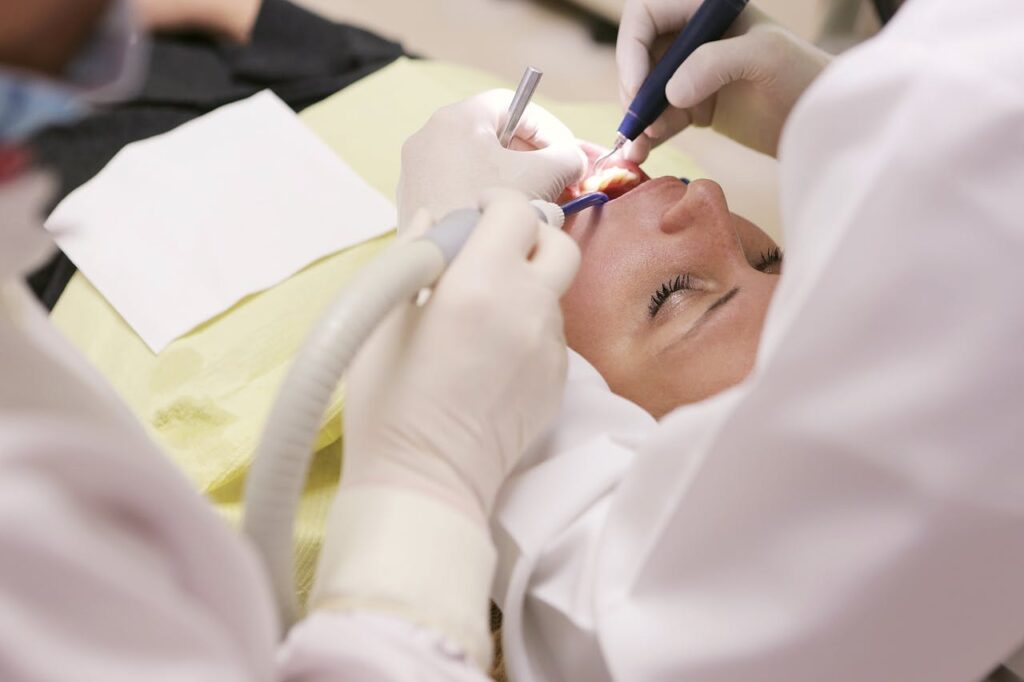
Brushing your teeth is the cornerstone of good oral hygiene, and doing it twice a day is essential. Brushing in the morning removes the plaque and bacteria that accumulate overnight, while brushing before bed ensures that food particles and plaque are removed after a day of eating and drinking. It’s important to use a fluoride toothpaste, as fluoride strengthens tooth enamel and helps prevent cavities. Additionally, brush for at least two minutes, covering all surfaces of your teeth and your tongue. Remember to use a soft-bristled toothbrush to avoid damaging your gums and enamel. Proper brushing technique is just as important as brushing frequency. Brush in gentle circular motions to ensure that you clean both the surface and the gum line without causing harm.
Floss Daily to Reach the Gaps
Brushing alone cannot clean the tight spaces between your teeth, where plaque and food debris tend to gather. This is why flossing is an essential part of your oral care routine. Flossing at least once a day helps remove plaque and food particles from between the teeth and along the gum line, reducing the risk of cavities and gum disease. It’s important to use a gentle sawing motion when flossing and to curve the floss around each tooth to remove debris effectively. If traditional floss feels awkward, try using floss picks or a water flosser, which can also clean hard-to-reach areas. Make flossing a non-negotiable part of your daily oral care to ensure a thorough clean and prevent plaque buildup.
Use Mouthwash for Extra Protection
While brushing and flossing are fundamental, mouthwash can provide an added layer of protection against bacteria, plaque, and bad breath. A mouthwash that contains fluoride can also help prevent cavities by strengthening tooth enamel. Rinsing with mouthwash after brushing and flossing is a simple way to reduce the number of bacteria in your mouth, freshen your breath, and ensure that areas your toothbrush and floss may have missed are cleaned. Mouthwash can also help reduce inflammation in the gums and prevent gum disease. Swish the mouthwash around your mouth for about 30 seconds to a minute, making sure it reaches every corner of your mouth for maximum benefit.
Maintain a Healthy Diet for Strong Teeth
What you eat plays a significant role in the health of your teeth and gums. A balanced diet rich in nutrients helps promote strong teeth and gums. Foods high in calcium, such as dairy products, leafy greens, and almonds, help strengthen tooth enamel, while foods rich in vitamin C, such as citrus fruits and bell peppers, are crucial for healthy gums. Eating a diet that includes plenty of fruits, vegetables, and whole grains can also help stimulate saliva production, which naturally helps cleanse your mouth. Avoid sugary foods and drinks, as they can contribute to plaque buildup and increase the risk of tooth decay. Drinking plenty of water throughout the day also helps rinse away food particles and keep your mouth hydrated.
Schedule Regular Dental Checkups
No matter how diligent you are with your oral hygiene at home, regular dental visits are essential for maintaining long-lasting dental health. Professional cleanings by a dentist or dental hygienist remove tartar buildup that can’t be addressed with brushing and flossing alone. Your dentist will also check for early signs of tooth decay, gum disease, or other oral health issues, allowing you to address problems before they become more serious. Aim to schedule a dental checkup every six months. During these visits, your dentist will offer personalized advice on your oral care routine and recommend any additional treatments or improvements for better health.
Your Guide to Effective Oral Hygiene
Good oral hygiene is essential not only for a beautiful smile but also for maintaining overall health. The mouth is the gateway to the rest of the body, and when neglected, poor oral hygiene can lead to serious health issues, including gum disease, cavities, and even heart disease. By following a few simple and consistent practices, you can keep your mouth clean and healthy, ensuring a lifetime of bright smiles.
The Importance of Brushing
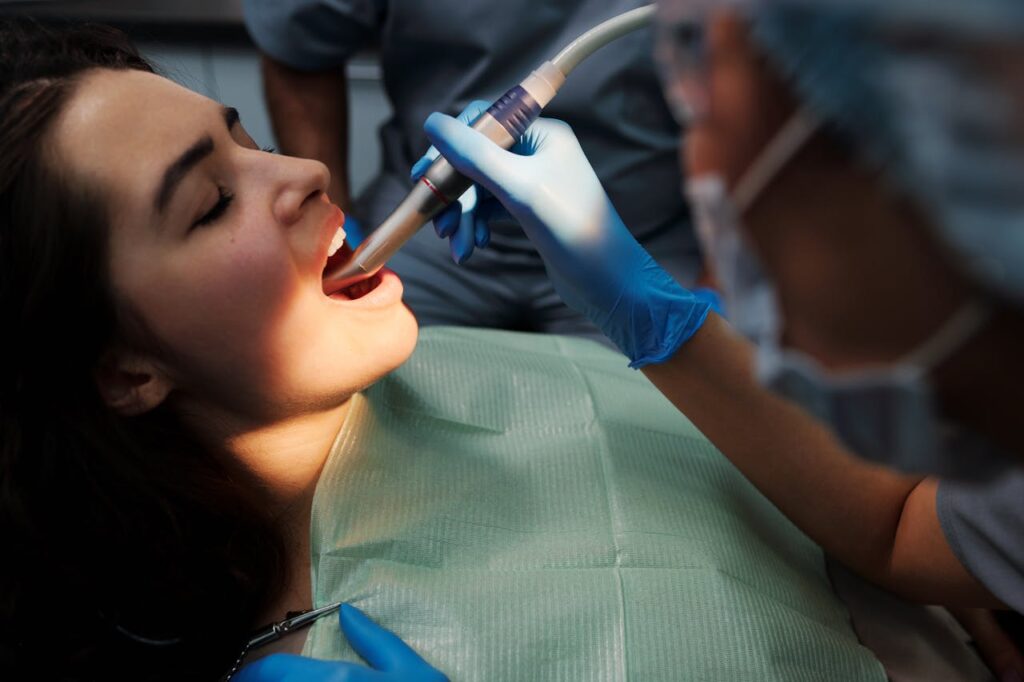
Brushing your teeth is the foundation of effective oral hygiene. The American Dental Association (ADA) recommends brushing at least twice a day, once in the morning and once before bed, to remove plaque and prevent cavities. It’s important to use a fluoride toothpaste, as fluoride strengthens tooth enamel and prevents decay. Choose a soft-bristled toothbrush that won’t damage your gums and brush for at least two minutes. Pay attention to the back molars and the gum line, as these areas are more prone to plaque buildup. Don’t forget to replace your toothbrush every three to four months, or sooner if the bristles are frayed, to maintain optimal cleaning.
The Power of Flossing
While brushing your teeth is essential, it doesn’t clean between your teeth where food particles and plaque can accumulate. This is where flossing comes in. Flossing is an important part of your daily oral hygiene routine and helps to remove debris and plaque that your toothbrush can’t reach. The ADA recommends flossing once a day, using a gentle sawing motion to slide the floss between each tooth. Flossing also helps reduce the risk of gum disease, which can lead to tooth loss if untreated. If traditional flossing feels difficult, you can also try floss picks or water flossers, which can be easier to maneuver and still effectively clean between your teeth.
Rinse with Mouthwash
Mouthwash can be a helpful addition to your oral hygiene routine. It helps to reduce the number of bacteria in your mouth, making it a great complement to brushing and flossing. Look for a mouthwash that contains fluoride to help prevent cavities and strengthen enamel. Some mouthwashes also contain antibacterial properties that help combat gum disease and bad breath. After brushing and flossing, rinse with mouthwash for about 30 seconds to a minute. Swishing the mouthwash around your mouth helps reach areas your toothbrush and floss may have missed, ensuring a more thorough clean.
Eat a Balanced Diet for Strong Teeth
What you eat plays a crucial role in your oral health. A balanced diet rich in vitamins and minerals can help keep your teeth strong and your gums healthy. Foods like dairy products, leafy greens, and almonds are high in calcium, which helps build and maintain strong teeth. Foods rich in vitamin C, such as citrus fruits and bell peppers, promote healthy gums. Avoid sugary snacks and drinks, as they fuel the bacteria in your mouth that can cause cavities and tooth decay. Drinking plenty of water also helps wash away food particles and bacteria, keeping your mouth hydrated and clean.
Regular Dental Visits
Even if you have an excellent oral hygiene routine at home, it’s still important to visit your dentist regularly for professional cleanings and checkups. Dentists can remove tartar buildup that brushing and flossing can’t, and they can spot early signs of tooth decay, gum disease, or even oral cancer. Regular checkups ensure that any issues are caught early, preventing them from turning into bigger problems. The ADA recommends visiting the dentist at least once every six months. During these visits, your dentist will clean your teeth, check for any potential issues, and provide advice on how to improve your oral hygiene practices.
Essential Oral Care Tips for a Bright Smile
Maintaining a bright and healthy smile goes beyond just brushing your teeth. Good oral care practices are essential for preventing dental issues such as cavities, gum disease, and bad breath. By following a few simple steps, you can ensure your teeth stay bright and healthy for years to come.
Brush Your Teeth Twice a Day
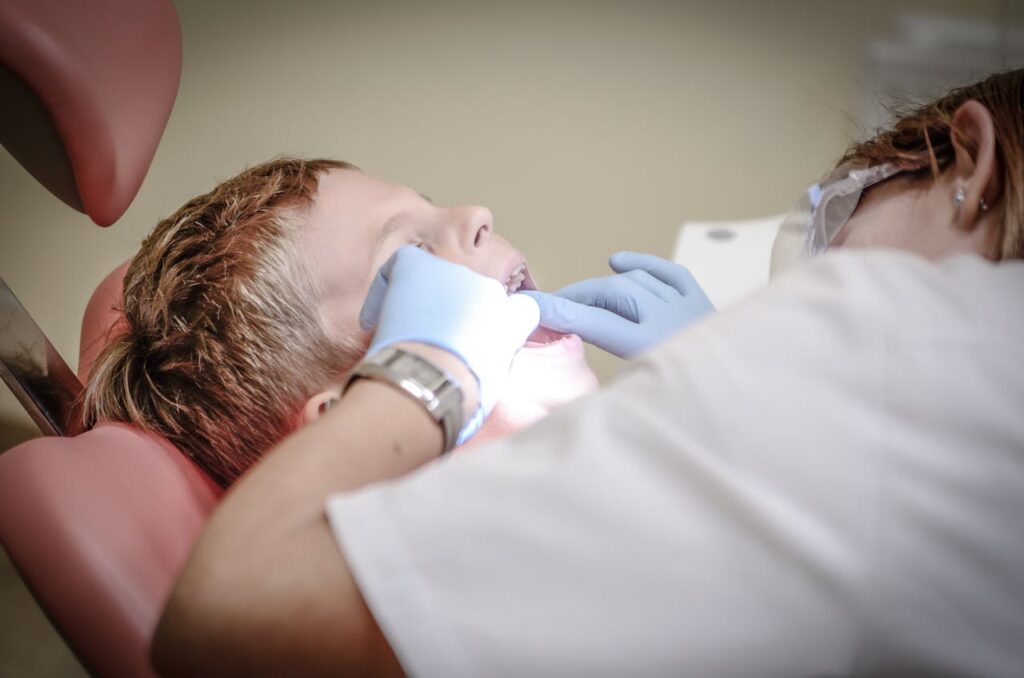
One of the most fundamental aspects of oral care is brushing your teeth. Brushing at least twice a day – once in the morning and once before bed – helps remove plaque and food particles that can lead to cavities and gum disease. It’s crucial to use a fluoride toothpaste and a soft-bristled toothbrush. Be sure to brush for at least two minutes, covering all surfaces of your teeth. Don’t forget to brush your tongue as well, as it can harbor bacteria that contribute to bad breath and an overall unpleasant taste in your mouth.
Floss Daily for a Deeper Clean
Brushing alone may not reach all the areas between your teeth, which is why flossing is so important. Flossing helps clean those hard-to-reach spots, preventing plaque buildup and food particles from becoming trapped between your teeth. A good flossing routine can help avoid gum disease and cavities, making it an essential part of your oral care regimen. Aim to floss gently every day, curving the floss around each tooth to remove any debris and bacteria lurking in between.
Rinse with Mouthwash
Using mouthwash can give your oral care routine an extra layer of protection. Not only does it freshen your breath, but it also helps reduce bacteria in your mouth and prevents plaque buildup. Choose a mouthwash that contains fluoride, as it helps strengthen enamel and protect your teeth from cavities. After brushing and flossing, swish the mouthwash around for about 30 seconds to a minute, ensuring it reaches all parts of your mouth for maximum benefits.
Eat a Tooth-Friendly Diet
Your diet plays a significant role in the health of your teeth. Foods rich in calcium, such as dairy products, leafy greens, and almonds, help strengthen tooth enamel and keep your teeth strong. Additionally, foods like apples, carrots, and celery naturally help clean your teeth as they stimulate saliva production, which in turn helps wash away food particles and bacteria. Avoid sugary snacks and beverages, as they contribute to plaque formation, decay, and other dental issues.
Regular Dental Checkups
Visiting your dentist regularly is an essential part of maintaining a bright and healthy smile. Even if you follow a good oral care routine, a professional cleaning can remove tartar buildup that your toothbrush and floss can’t. Dentists can also spot early signs of issues like cavities, gum disease, and oral cancer, allowing you to address any problems before they become serious. Scheduling checkups every six months is a simple step that can ensure your teeth stay in optimal condition.
